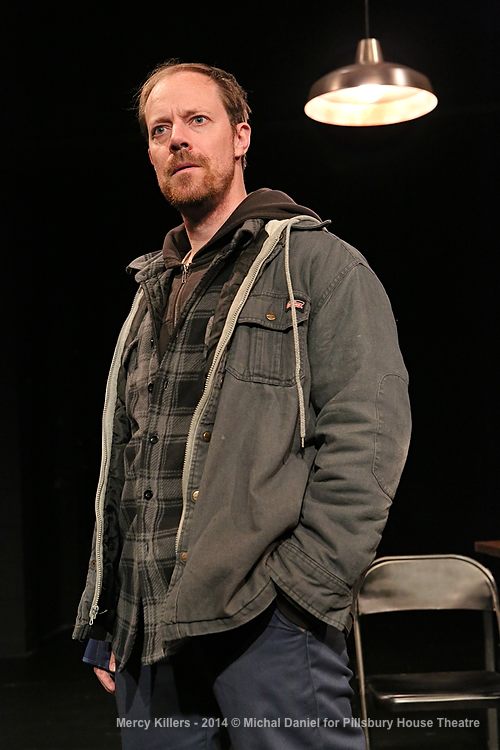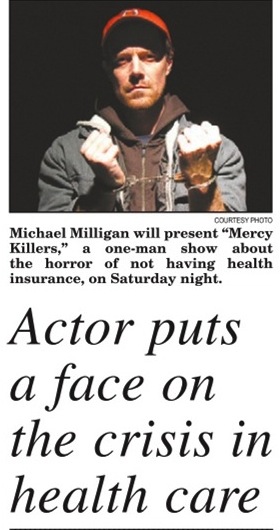Playwright as Tribune- Scotsman Mercy Killers review: “5 Stars.”
Sep 27, 2014 Notes from the Road, Reviews
5 Stars, The Scotsman. Edinburgh.
There’s a marvellous and mysterious kind of alchemy at work in author and actor Michael Milligan’s mesmerising, harrowing indictment of US healthcare. Not only is it theatre distilled to its most basic essentials – one ordinary individual telling his story, as if to an invisible interrogator, his only props a table and chair – but it’s unambiguously specific in its objectives: to attack a system responsible for more than 60 per cent of US personal bankruptcies, within which most of those driven to this last resort had health insurance when their medical problems began.
It’s also patently fuelled by profound outrage, and yet all these elements are so skilfully and meticulously controlled, in both the writing and performance, so thoroughly transmuted in service of storytelling, drama and characterisation, that the effect is gripping first and foremost on a painfully human level, even as Milligan simultaneously delves beneath the foreground issues to the personal and national philosophies underlying the debate Stateside….
Read the entire review from The Scotsman
Now playing at the American Theater Company
Chicago Critic reviews Mercy Strain at ATC
Sep 27, 2014 Notes from the Road
In this 57 minute one person drama, Mercy Strain, we meet a working class rural Ohio man, Joe, who tells the police about the events that brought the cops to his home. Joe is a red-neck Rush Limbaugh listener whose life falls apart when his young wife is diagnosed with breast cancer. When their insurance cannot cover his wife’s treatments, bankruptcy ensues and then, divorce follows so Medicaid can help save her.
Michael Milligan’s fantastic and deeply emotional performance aptly dramatized the problems of our healthcare system. Milligan puts the struggle into stark human terms with all the dyer effects. Milligan is a polished performer who quickly engages us into his world of nightmares. This piece is the best argument for Obama care that I seen yet.
These two parts of the healthcare plays are riveting theatre. They play separately. I’m not sure who the audience is for Let Me Down Easy or Mercy Strain since 20-30somethings and seniors alike don’t like to speak or think about death and sickness. But the two performance (by Usman Ally and Michael Milligan) compel us to get to ATC.
Recommended
Tom Williams
Read the entire review at Chicagocritic.com
Mercy Strain Review Chicago Reader
Sep 27, 2014 Notes from the Road
Review of Mercy Strain at the American Theater Company in Chicago
RECOMMENDED
“A pre-Obamacare study from 2009 found that a large percentage of Americans are one serious illness away from financial ruin. This gripping hour-long monologue by writer-performer Michael Milligan details precisely how it might happen. Milligan plays an Appalachian auto mechanic whose wife is diagnosed with breast cancer at the height of the great recession. As her condition worsens, astronomical medical bills pile up, the house goes into foreclosure, and mounting desperation finally leads to an act of violence. Though Milligan obviously intends to show us how unfair things can be for the working poor, his script is more than propaganda; the protagonist is allowed his flaws, contradictions, and idiosyncrasies. As a performer, Milligan is riveting, conveying a fascinating mix of decency, heartbreak, and impotent fury.” —Zac Thompson
Read the original review from the Chicago Reader
Review of Mercy Strain in Chicago: “a simple but powerful cry for change.”
Sep 26, 2014 Notes from the Road
A review from a theater critic in Chicago from the run at the American Theater Company.
New City Stage
RECOMMENDED
As I walked into the theater and was greeted by the set for “Mercy Strain” I had to smile to myself. The show has been advertised as a hit at the 2013 Edinburgh Fringe Festival, and as it happens I have just recently returned from a visit to the 2014 festival. While there, my friends and I joked that every show we saw had a few things in common, namely the fact that they all included very few actual things. The slots in Edinburgh are so tight that any extraneous props or set pieces have to be cut, lest the time you spend setting up lead to the lights being switched off mid-climax because you’ve run five minutes over. The perfect Fringe show, we would say, probably involves nothing more than a table, a chair and one actor just acting his butt off. Lo and behold, the set for “Mercy Strain” turns out to consist of one table and one chair. All that was needed was one actor acting his butt off and the set would be complete. Happily, by the end of the evening, actor Michael Milligan’s butt is nowhere to be found.
Read the entire review at New City Stage
Theater Review: Mercy Killers Off Broadway “Milligan manages to strip down the arguments by humanizing them to an immensely profound degree.”
Feb 23, 2014 Notes from the Road
“As residents of the “land of the free and home of the brave”, we are indoctrinated from an early age that the American dream is obtainable with just a bit of hard work and determination. For most, it is achievable. By proverbially “rolling up our sleeves” and “putting a little elbow grease into it”, we can reap the benefits of our labor by acquiring basic necessities and even enjoying luxuries as a self-reward. Alternatively, there remains a majority of people who have played by these rules–muddling through the every day grind with mettle and handling adversity with fortitude—and yet they still manage to come up short. Joe is in that majority.
Michael’s Milligan’s blistering one man drama, Mercy Killers, explores the frustrations and inequalities of a failed healthcare system through the eyes of this average “Joe”. This hour-long, literal examination is effectively staged in a black box, bare bones theater, where our protagonist is defending himself in an interrogation room for a “crime” that blurs the lines of convention. Milligan, who both wrote and performs the show, paints a comprehensive and challenging portrait of a wounded man exhausted by a circle of despair and grief.
His arsenal of rationale is depleted. Milligan’s everyman language resonates and pierces and although we can relate to elements of his plight, we hope never to fully confront its’ level of severity.
After reaching for our coats and trudging through the somber audience, my guest and I engaged in a conversation about Milligan’s exceptional work. Questions were posed and even more left unanswered about the lengths at which our leading player could have gone to have prevented his outcome . Each of us had differing opinions, but we created a dialogue about this crucial crisis. In our ever-present day of political discourse, finger-pointing, and profitable racket over healthcare, Milligan manages to strip down the arguments by humanizing them to a frustrating, but immensely profound degree.”
Read the entire review at Manhattan Digest.
Mercy Killers review from the Fringe: “Thoroughly Moving” | 4 Stars
Aug 5, 2013 Notes from the Road
From BROADWAY BABY REVIEW by Brett Herriot:
“Thoroughly Moving”
Broadway Baby Rating: 4 STARS
Tucked away in the Baillie room of the Assembly Hall venue is a play tackling the healthcare crisis plaguing America and asks the vital question, how far would you go to help a loved one?
Written and Performed by Michael Milligan, this one man tour de force opens as the police arrive to question a husband whose wife has died in mysterious circumstances. What follows in the ensuing hour is a comment on the struggle for ordinary americans to access the health care and support they desperately need. Even with the promises of Barack Obama it’s still not enough for those living on the edge with a terminally ill loved one.
Milligan is able to blur the lines between truth and fiction to portray the immediate impact on the life of a man who is gripped by grief and raging at a system which has systematically let him down. His performance never falters through an array of emotional high and low points.
Tight direction by Tom Oppenheim ensures that Milligan’s story despite its serious nature is not without hope. Adding to the oppressive feeling of the piece is the choice of a totally pitch black theatre with dim, atmospheric lighting, an effective choice by the director and production team.
This is a wonderfully executed piece of political theatre, focusing not on those in power, but choosing instead to shine a light on the reality of the people are suffering and dying through lack of care. It highlights the flaws in a system which is only useful for those who can afford its privileges.
This is one man theatre at its very best and is something the fringe should embrace with gusto. If you love to be challenged by the theatre you’re watching and leave the theatre willing to ask the questions that make a difference then Mercy Killers is a shining example of provocative theatre and production you don’t want to miss out on.
Read the original review at Broadway Baby.
Review, 5 STARS: “Milligan’s performance is incredibly powerful and passionate …”
Aug 5, 2013 Notes from the Road
“Raw, emotional and devastatingly honest. When Joe’s wife is diagnosed with cancer and the health insurance company refuses to pay, his life and his beliefs begin to fall apart. Broadway actor Michael Milligan’s solo show gives an insight into the destructive personal impact of the American health care system. It makes public the private stories of thousands of Americans and shows an urgent need for change in a system failing so many. His performance is incredibly powerful and passionate, sweeping the audience up in Joe’s story; making them laugh sometimes and bringing them to the edge of tears at others. Milligan has written a beautifully moving and thought-provoking piece that will leave you feeling a mixture of thankful, angered and saddened.” 5 Stars | By Anita Magee
Read the original review at ThreeWeeks.
Mercy Killers review from Athens: “A tragic tale of social crimes that indicts not just our government, but our culture …”
Mar 5, 2013 Notes from the Road
by Aaron Smith
Mercy Killers, a one-man, one-act play written and performed by Michael Milligan, made what is sure to be a lasting impression at ARTS/West last Monday, February 25. Boldly and wonderfully acted, the play left many audience members in tears, inspiring both compassion and a sense of the need for change. Milligan, a Broadway actor and Ohio State University alum, is currently on tour performing his act in cooperation with SPAN Ohio in order to advocate health care reform in the United States. His play, first and foremost, is an attempt to speak out on behalf of the gross numbers of individuals who have spiraled into bankruptcy as a result of medical debt. In performance, however, Milligan does much more than this. With an eye toward individualism and the American dream, Mercy Killers ultimately calls for—much more than medical reform—reform of the values that comprise our culture today.
The play opens in contemplative darkness, with an excerpt from Woody Guthrie’s “This Land is Your Land” crackling overhead. Suddenly, just as soon as it was presented, the suspicious peace in which this leaves the audience is interrupted when the singer’s crooning is jarringly cut off by the sound of a siren, a crash, and a bright light that reveals our character staring anxiously but intently at the audience. Sitting at a table in a police station, face to face with a cop whom we never see, our protagonist Joe mouths the words “You’re in trouble.” He appears to be either incredibly anxious, or drunk, or both; but what begins to look like a police interview with an average criminal turns our to be much, much more. The police station, rather, becomes a venue for our protagonist’s testimony, and the act seamlessly transforms into the retelling of a tragic love story.
Joe is a staunch libertarian who, unlike many in our day and age, still believes in some notion of the American dream. He listens to Rush Limbaugh, asserts his self-reliance, and aspires only to make a simple, honest living doing what he does best: auto mechanics. Though he has no sizable wealth—he and his wife took their honeymoon in the mountains of Virginia, after all—he is confident in his skills and hopes to make enough to raise a family some day. Despite all this, his convictions about honesty and self-reliance are irrevocably shaken when his wife Jane is diagnosed with breast cancer only a few years into their marriage.
This crisis touches off the couple’s financial decline, as surgery and chemotherapy and even mere consultations leave them with medical bills piling up. After selling their home—as if circumstances weren’t already bad enough—Joe and his wife are driven to further desperation by medical malpractice and mortgage fraud. And the thing about desperation, Joe remarks, is that it makes you “bend your own rules.” Despite his professed belief in honesty and virtue, he is made to begin taking advantage of customers at his auto shop in an attempt to gather enough money to keep the bank at bay. The insurance company cuts the couple off; and as they stare down the throats of the financial overseers of the nation it becomes unclear which is the more dangerous disease, Jane’s cancer, or the dehumanizing and self-interested nature of the United States health care system. As the story steers toward its tragic but inevitable conclusion, one can hardly help but weep alongside Joe for the injustices he—and by extension the innumerable victims of our dog-eat-dog society—faces at every turn.
Of the many solutions Joe and Jane imagine to their plight, suicide is the most heart-rending. The term “mercy killer,” referring to one who commits euthanasia, implies that death can be more humane than certain degrees and kinds of suffering. According to Milligan, however, the meaning behind Mercy Killers is intentionally deeper than that. If “mercy” is another word for compassion—and action taken to reify that compassion in light of alleviating human struggles—then a “mercy killer” can in fact be a person, institution, or entire system that ignores and destroys the potential for this compassion among people. In this all the constituent institutions of our health care system—the hospitals, insurance agents, pharmaceutical companies, etc.—as well as the politicians and lawmakers that perpetuate it, are implicated.
While this reality communicates something highly political—that is, the need for health care reform—Mercy Killers is equally about something much more cultural and individual. Milligan claims that “Actually, Joe doesn’t really care about politics, as I think a lot of Americans don’t. It’s just kind of an identity game. You sort of lean this way or that because of the people you tend to hang around,” and it’s true: while someone like Joe might pride themselves with the label “libertarian,” Joe’s rugged individualism is much more a personal philosophy than a political ideal.
But as this philosophy stems in large part from the greater American culture surrounding him, part of the play’s message is that this philosophy is in many ways no longer adequate for our society. The kind of libertarian individualism that Joe advocates—its small-town notions of self-reliance, independent gain, and privileging of local community over big government—we see is ultimately largely responsible for Joe’s circumstances. On one hand, he is taken advantage of by many, including those working in the hospitals, pharmacies, and courts, etcetera, whose desires are for independent gain; and on the other hand we see that his assumption of his own self-sufficiency is misguided and inadequate toward alleviating his struggles.
Milligan compares his story to the classic story of Oedipus, in which the titular character discovers that it is actually himself that is responsible for the plague in Thebes. Perhaps the most striking of Mercy Killers’ implications is that Joe, because of his own cultural predispositions, has actually contributed to the suffering of people like himself. It is the same attitudes (though admittedly brought about by need rather than want) causing him to take advantage of his customers that cause medical officials to take advantage of him and his wife; and we see the effects of this attitudes in the impersonal nature with which Joe is treated in his struggle, his alienation from his community, and his deteriorating relationship with Jane. In the end, Joe’s peace of mind, just like that touted by the Guthrie tune at the play’s open, is crudely interrupted.
Mercy Killers is thus a call for both health care reform and cultural reform. In the most immediate sense we must change our health care system in order to remove its dehumanizing aspects and prevent it from privileging wealth over people; SPAN Ohio advocates the benefits of the single-payer system, in which the government is responsible for health care costs, to these ends. In a broader sense, however, the play calls for us to examine and redefine our individual and cultural values. As the playwright puts it, “the ‘individualism’ meme is overhyped and romanticized and…historically inaccurate.” Rugged cowboy individualism, though often portrayed as the backbone of the American dream, did not actually inspire and will not sustain the nation. Rather, we need to return to a more nuanced view of the community as a social and political body, a venue that can mediate the needs and responsibilities of the public and private sectors—the government, and the individual. In order to do so, we must first replace a philosophy of pure individualism–which has been outmoded or, as some would have it, was never relevant in the first place–with a communitarian one which, while still validating the individual, can still serve the mass’s common needs. With this view, Mercy Killers is not only about reclaiming our health care, but about reclaiming our humanity from a brutal and shortsighted system. Milligan quotes an age-old Moravian motto as a potential foundation for addressing these concerns: “In that which is essential, Unity. In that which is not essential, Liberty. In all things, Love.”
Mercy Killers is a must-see for those affected by a health care system in need of reform, for those whose strength and self-reliance has not brought them the success they were promised, and for everyone else as well. Milligan will be performing at the Van Fleet in Columbus, Ohio from now through March 9; and for those unable to attend a performance the play will be filmed and posted online for free viewing shortly after.
Read the original review at Critical “I”
Mercy Killers review from Columbus: “….much more than a glorified sermon.”
Feb 26, 2013 Notes from the Road
Thanks to Richard Ades for seeing the show: “All but the most hard-hearted audience members are likely to find themselves tearing up when the moment of truth finally arrives.”
Dittohead with a grudge against the health-care system
by Richard Ades for Columbus Theater
Mercy Killers is a play with a message.
Playwright/actor Michael Milligan makes no attempt to hide that fact. And even if he did, the secret would be out as soon as you hit the ticket table and found it littered with handouts from a group called the Single-Payer Action Network.
The one-man play’s message is that America’s health-care system leaves people vulnerable to physical and financial ruin. And that’s true even if they have health insurance.
Fortunately, Ohio State alum Milligan is a thespian rather than a clergyman. As a result, the play is much more than a glorified sermon.
Mercy Killers in Jackson Hole!
Jan 25, 2013 Notes from the Road
Jackson Hole News and Guide
Who: Actor Mike Milligan
What: One-man play, ‘Mercy Killers’
Joe works hard, provides for his family and sympathizes with the Tea Party’s notion of self-reliance.
Until, that is, his wife is diagnosed with cancer and dropped from the family’s health insurance policy.
Juilliard School-trained Broadway actor Mike Milligan brings his tale of heartbreak and the health care system, “Mercy Killers,” to Jackson to kick off his tour of the play. His one-man performance will recount Joe’s life as he begins to understand the limits of personal responsibility.
The former Jackson resident based his play on his own experiences living without health insurance and on his friends’ experiences. It’s a horror story of sorts.
“It became very clear to me what Americans were experiencing,“ Milligan said. “We kind of have a chop suey version of health care that has some of the worst qualities of [all the] systems.”
What’s more astonishing, Milligan said, is that the majority of bankruptcies are due to medical debt, whether from insured patients being dropped from their policies or from people who don’t have coverage.
He knows a couple whose newborn needed surgery. Weeks later, they received a bill from the anesthesiologist for $10,000. His services were not included on their health insurance plan.
“You’re bringing a new life into the world, and you’ve got this dark cloud over the house,” he said. “How are we welcoming our kids into this world? The problem isn’t that people don’t have health insurance, it’s that the insurance isn’t worth a damn.”
He also related the confession of a woman who took a health insurance job after a stint of unemployment in New York. She was instructed to reject applicants from the Bronx and Harlem, the idea being that the geographically challenged people there would not be able to appeal the decision.
The system has left many people to become their own doctors, Milligan said, “crawling to the computer to diagnose” their ailments, much like he did during a bout of kidney stones.
Milligan sees health care as a moral imperative. He’s working to put a face to the looming problem.
The play “doesn’t present a political solution,” he said, but it “does come down on health care as a basic right.”
Milligan’s brother, Corey, lives in Jackson Hole.








